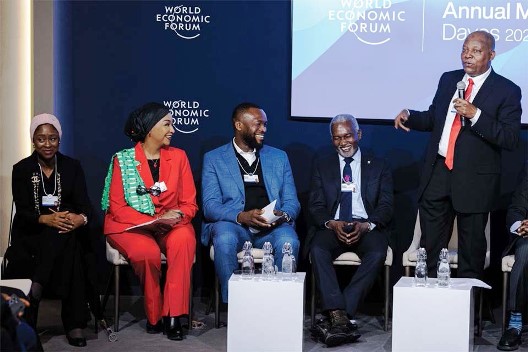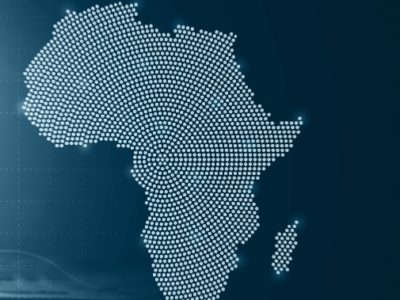By Engr. Gbolahan M.A. Alabi-Isama MS. Founder/CEO at Supercomafrica
Yes, I did get my steps in. Those mountain walks were no joke! ️
Dr. ‘Bosun Tijani, Nigeria’s Minister of Communications, Innovation and Digital Economy, isn’t just a technocrat; he’s a force of nature. This past week at Davos, he showcased the country’s potential to a global audience, forging partnerships, securing commitments, and championing the transformative power of technology. His LinkedIn post is a vibrant tapestry of his whirlwind journey, brimming with optimism and a relentless drive for progress.
RELATED: Bosun Tijani and Nigeria’s AI pursuit for dark data from the global south
The World Economic Forum (WEF) in Davos just wrapped up, and Nigeria’s presence was undeniable. At the forefront of this digital charge stood Dr. Bosun Tijani, Nigeria’s Minister of Communications, Innovation and Digital Economy. His whirlwind week offers a treasure trove of insights, successes, and questions that ignite a critical conversation about Nigeria’s digital future.
We’ve all seen the Headlines: “Nigeria secures 2.5B USD for public digital infrastructure.” But Dr. Tijani’s efforts at WEF go beyond mere headlines. They paint a vibrant picture of a nation actively forging its digital destiny.Beyond the glitz and glamour, Davos was a crucible for forging connections and tackling critical challenges. Here are some highlights that left me feeling energized and optimistic:

Dr. Tijani on Gender Equality

Dr. Tijani on Child Online Safety.
Highs From the Mountaintop:
- Building Bridges, Sparking Trust: Dr. Tijani’s insightful interview on rebuilding trust through technology resonated deeply. He emphasized how digital tools can empower active citizenship and bridge the gap between leaders and the people they serve. This message resonated in a world grappling with eroded trust and misinformation.
- Promising Partnerships: Tijani secured commitments from various players, including the EDISON Alliance to Cisco and the Bill & Melinda Gates Foundation, UNDP, and WorldQuant University, on initiatives that promised investments, technical expertise, and infrastructure support crucial for bridging Nigeria’s internet access and talent development gaps. These partnerships, if effectively utilized, can be game-changers.
- Global Recognition: Nigeria’s presence at Davos was significant, with Vice President Kashim Shettima leading the delegation and the country featuring in key discussions. This global recognition speaks volumes about the potential within reach.
- Focus on Challenges: Acknowledging the disparities in internet access and the shortcomings of the existing National Broadband Plan was a crucial step. Addressing these limitations openly is the first step towards overcoming them.
Lowlands of Concern:
- Results-oriented leader: Dr. Tijani is not just a talker; he’s a doer. His focus on concrete action and measurable outcomes is evident in his initiatives, such as the Build-A-Thon event and the ongoing efforts to reform the National Social Investment Programmes.
- The Urban-Rural Divide: Despite growth in internet adoption, the rural-urban digital divide remains stark. The plan needs to prioritize rural connectivity solutions without neglecting urban infrastructure upgrades.
- Slow Progress: The Revised National Broadband Plan’s goals haven’t been met, and current broadband penetration sits below 50%. Faster implementation and clearer benchmarks are vital for tangible progress.
Building an African Tech Ecosystem: Davos provided a platform to champion collaboration among African nations. We need to leverage our collective strengths and data to create a single, thriving market, unlocking the continent’s immense potential.
The Roadmap Ahead:
- Prioritize Connectivity Solutions: Rural areas need tailored solutions like low-orbit satellite constellations and last-mile connection grants for small and medium enterprises. Affordable, quality internet for all must be the focus.
- Optimize Regulatory Framework: The outdated Nigeria Communication Act needs an overhaul to encompass advancements in AI, blockchain, and broadband technology. A future-proof legal framework is key for encouraging innovation.
- Data-Driven AI Interventions: Leverage existing datasets and develop targeted AI applications, starting with tackling real-world challenges like terrorism. Demonstrating effectiveness will build trust and pave the way for further AI implementations.
Beyond the Headlines:
Dr. Tijani’s WEF odyssey wasn’t just about securing deals and commitments. It was about positioning Nigeria as a proactive player in the global digital landscape. It was about sparking conversations, igniting collaborations, and raising the bar for digital development within the nation. Dr. Tijani’s tireless efforts extend far beyond international conferences. He actively engages with stakeholders within Nigeria, ensuring all voices are heard and solutions are tailored to the country’s specific needs. His recent meetings with the Special Presidential Panel and his focus on improving internet quality are testaments to his dedication to internal progress.
Championing Inclusion and Innovation: I had the opportunity to discuss promoting inclusion through the Fourth Industrial Revolution (4IR) with global leaders. From healthcare to education, 4IR holds immense potential for solving challenges and improving lives. We’re exploring alternative funding mechanisms to establish a 4IR Centre in Nigeria, positioning us as a leader in this transformative era.
Challenges and Opportunities:
While Dr. Tijani’s Davos triumphs are commendable, substantial challenges remain. The need for updating the Nigeria Communication Act 2003 to reflect technological advancements like AI and blockchain is crucial. Additionally, ensuring equitable access to affordable internet and bridging the urban-rural digital divide demand continued focus and innovative solutions.
Building an AI-powered future:
While the focus on broadband and talent development is crucial, I believe Nigeria can’t afford to neglect the potential of Artificial Intelligence (AI). An AI-based terrorism intervention model, as I suggested, could be a game-changer in the fight against national security threats. Dr. Tijani’s leadership in harnessing AI for societal good would be a visionary step towards a safer and more prosperous future.
However, Dr. Tijani’s work is not without its challenges. The digital divide remains a significant hurdle, and the policy landscape needs to adapt to keep pace with the rapid advancements in technology. We can all play a role in supporting Dr. Tijani’s vision for a digitally empowered Nigeria by:
- Demanding Stronger Policies: We need to advocate for policies that prioritize affordable internet access, data privacy, and digital literacy.
- Supporting Local Initiatives: There are numerous organizations and individuals working to bridge the digital divide in Nigeria. Find one that resonates with you and offer your support, whether it’s volunteering your time, donating resources, or spreading awareness.
- Holding our Leaders Accountable: We need to ensure that Dr. Tijani and other government officials are held accountable for their promises. Stay informed, ask questions, and participate in the democratic process
In conclusion, Dr. Tijani’s leadership is inspiring. His unwavering belief in the power of technology to transform Nigeria is infectious. By fostering partnerships, investing in talent, and tackling critical challenges head-on, he is paving the way for a brighter digital future for all Nigerians. As Dr. Tijani aptly put it, “With sustained and intentional action, we will deliver on the promise of a better Nigeria.” This is our digital story. Let’s write it together.
This article is for educational purposes and does not constitute legal, financial, political, etc., advice. For specific advice applicable to you or your business, please contact a professional.


































